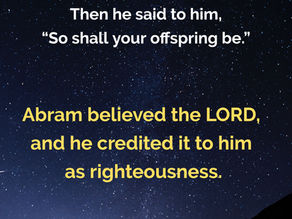1 Corinthians 11:23-26 - A Powerful Invitation
- Chad Werkhoven
- Jul 14, 2023
- 3 min read
God calling you to His Table is both a gracious invitation and a powerful command.

Read / Listen
Read 1 Corinthians 11:23-26
23 For I received from the Lord what I also passed on to you: The Lord Jesus, on the night he was betrayed, took bread, 24 and when he had given thanks, he broke it and said, “This is my body, which is for you; do this in remembrance of me.” 25 In the same way, after supper he took the cup, saying, “This cup is the new covenant in my blood; do this, whenever you drink it, in remembrance of me.” 26 For whenever you eat this bread and drink this cup, you proclaim the Lord’s death until he comes.
Listen to passage & devotional:
Heidelberg Catechism Q&A 77
Q. Where does Christ promise
to nourish and refresh believers
with his body and blood
as surely as
they eat this broken bread
and drink this cup?
A. In the institution of the Lord’s Supper:
“The Lord Jesus, on the night he was betrayed,
took bread, and when he had given thanks,
he broke it and said, ‘This is my body, which is for you;
do this in remembrance of me.’
In the same way, after supper he took the cup, saying,
‘This cup is the new covenant in my blood;
do this, whenever you drink it, in remembrance of me.’
For whenever you eat this bread and drink this cup,
you proclaim the Lord’s death until he comes.”
This promise is repeated by Paul in these words:
“Is not the cup of thanksgiving for which we give thanks a participation in the blood of Christ? And is not the bread that we break a participation in the body of Christ? Because there is one loaf, we, who are many, are one body, for we all partake of the one loaf.”
Summary
This is a summarized paraphrase of the commentary Dr. Zacharias Ursinus, the author of the Heidelberg Catechism, wrote regarding QA 77.
The Lord's Supper was instituted by Jesus on the night He was betrayed, during the last celebration of the Passover. This marked the end of ancient sacrifices and the establishment of a new sacrament. The Passover symbolized Christ's future sacrifice, while the Lord's Supper signifies its fulfillment. By instituting it at the time of His death, Jesus made it a testament or last will.
During the Supper, Jesus took unleavened bread, similar to the what was eaten during the Passover feast. However, this specific type of bread is not necessary for the celebration. The bread used in the Lord's Supper spiritually nourishes the soul, strengthens faith, and signifies union with Christ.
Before distributing the bread, Jesus gave thanks. This signifies gratitude to the Father for His redemptive plan. Jesus then broke the bread, symbolizing His suffering and graphically depicting what would happen to His own body, how He Himself, like the one loaf, would be distributed to all who trust in him.
When Jesus said, "Take, eat," He commanded His disciples and the New Testament church to partake in the Supper. This highlights that the Lord's Supper should not be a mere spectator event or a private supper for priests, but a communal act of receiving and eating the elements.
Regarding the statement, "This is my body," Jesus referred to the bread as a sign or sacrament of His body. The bread does not physically become His body but signifies it. Likewise, the promise attached to the sacrament establishes a connection between the sign and the thing signified, not through physical union but through a sacramental union. The bread becomes the sacrament of Christ's body through this promise, which requires faith from the participants.
The Supper was instituted as a remembrance of Christ, including His death and the benefits He has obtained. It is not solely a meditation on His history but a remembrance that involves faith and gratitude. The Supper calls believers to remember Christ's sacrifice, appropriate His merits through faith, and publicly express gratitude.
Jesus commanded all to drink from the cup, refuting the practice of denying the laity the wine. The argument that the command only applied to the disciples present at the time is flawed, as all believers are referred to as priests in Scripture. The notion of concomitance, claiming that the blood is present in the bread, is also contradicted by Jesus' separate administration of the bread and the cup.
Dig Deeper
In conclusion, the Lord's Supper holds great significance as a memorial of Christ's sacrifice, calling believers to remember His benefits, exercise faith, and express gratitude. It is a communal act of partaking in the elements, symbolizing the body and blood of Christ.
The Supper should be observed with faith, unity, and gratitude, in accordance with the commandments of Jesus.
Dr. Zacharias Ursinus, 1563 - Age 29
ACKNOWLEDGE WHO GOD IS: Our Father, who sent His only begotten Son, whose body would be broken and blood poured out to redeem all those who believe;
ALIGN YOUR LIFE WITH GOD'S WILL: Ask God to begin preparing you now to appropriately respond to His gracious invitation to His table;
ASK GOD FOR WHAT YOU NEED:
Read the New Testament in a year, a chapter a day - Luke 13



















Comments